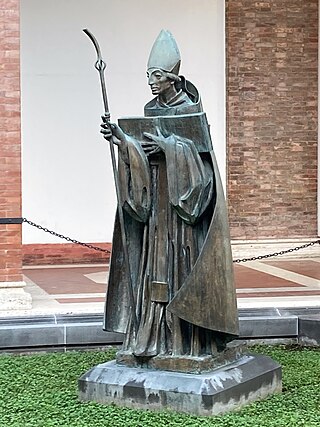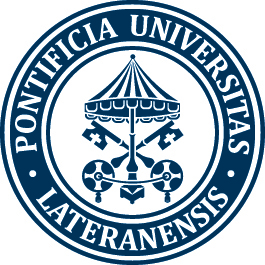Related Research Articles
Bioethics is both a field of study and professional practice, interested in ethical issues related to health, including those emerging from advances in biology, medicine, and technologies. It proposes the discussion about moral discernment in society and it is often related to medical policy and practice, but also to broader questions as environment, well-being and public health. Bioethics is concerned with the ethical questions that arise in the relationships among life sciences, biotechnology, medicine, politics, law, theology and philosophy. It includes the study of values relating to primary care, other branches of medicine, ethical education in science, animal, and environmental ethics, and public health.

The Pontifical Gregorian University, is a higher education ecclesiastical school located in Rome, Italy.
A pontifical university is an ecclesiastical university established or approved directly by the Holy See, composed of three main ecclesiastical faculties and at least one other faculty. These academic institutes deal specifically with Christian revelation and related disciplines, and the Church's mission of spreading the Gospel, as proclaimed in the apostolic constitution Sapientiachristiana. As of 2018, they are governed by the apostolic constitution Veritatis gaudium issued by Pope Francis on 8 December 2017.
Fidelis may refer to:

The Benedictine Confederation of the Order of Saint Benedict is the international governing body of the Order of Saint Benedict.
The Pontifical Council for Justice and Peace was a pontifical council of the Roman Curia dedicated to "action-oriented studies" for the international promotion of justice, peace, and human rights from the perspective of the Roman Catholic Church. To this end, it cooperates with various religious institutes and advocacy groups, as well as scholarly, ecumenical, and international organizations.
The Johns Hopkins Berman Institute of Bioethics in Baltimore, Maryland, United States, is an interdisciplinary center serving the entire Johns Hopkins University and Health System. It is dedicated to the study of complex moral and policy issues in biomedical science, health care, and health policy. Established in 1995, the Institute seeks answers to ethical questions by promoting research in bioethics and encouraging moral reflection among a broad range of scholars, professionals, students, and citizens. Contributing to its mission are four divisions of the University: the Zanvyl Krieger School of Arts and Sciences, the Johns Hopkins School of Medicine, the Bloomberg School of Public Health, and the Johns Hopkins School of Nursing. Johns Hopkins was the nation's very first research university

Sant'Anselmo all'Aventino is a complex located on the Piazza Cavalieri di Malta Square on the Aventine Hill in Rome's Ripa rione and overseen by the Benedictine Confederation and the Abbot Primate. The Sant'Anselmo complex, also known as the "Primatial Abbey of Sant'Anselmo" because it is the residence of the Abbot Primate, consists of: an ecclesiastical residential college known as the "College of Sant'Anselmo" ; a university known as the "Pontifical Athenaeum of Saint Anselm" ; the "Church of Sant'Anselmo" ; and the curial headquarters of the "Benedictine Confederation" and Abbot Primate. The complex and associated institutions are named in honor of the Benedictine monk Saint Anselm of Canterbury.
Albert R. Jonsen was one of the founders of the field of Bioethics. He was Emeritus Professor of Ethics in Medicine at the University of Washington, School of Medicine, where he was Chairman of the Department of Medical History and Ethics from 1987 to 1999. After retiring from UW, he returned to San Francisco, where he co-founded the Program in Medicine and Human Values at Sutter Health's California Pacific Medical Center in 2003.

The Pontifical Lateran University, also known as Lateranum, is a pontifical university based in Rome. The university also hosts the central session of the Pontifical John Paul II Institute for Studies on Marriage and Family. The university is known as "The Pope's University". Its Grand Chancellor is the Vicar General to the Holy Father for the Diocese of Rome. As of 2014 the Pontifical Lateran university had students from more than a hundred countries. It is also sometimes also known as the Pontifical University of Apollinaire.

The Salesian Pontifical University is a pontifical university in Italy run by the Salesians of Don Bosco. It has three campuses, one in Rome, one in Turin, and one in Jerusalem. The Salesian Pontifical University is an ordinary member of the International Federation of Catholic Universities, the European Federation of Catholic Universities, the European University Association and the International Association of Universities.

Elio Sgreccia was an Italian bioethicist and a cardinal of the Catholic Church. He was president of the Pontifical Academy for Life, director of the international medical ethics journal Medicina e Morale, president of the Ut Vitam Habeant Foundation and the Donum Vitae Association of the Diocese of Rome, and honorary president of the International Federation of Bioethics Centers and Institutes of Personalist Inspiration (FIBIP).
A pontifical university is a Catholic university established by and directly under the authority of the Holy See. It is licensed to grant academic degrees in sacred faculties, the most important of which are theology, canon law, and philosophy. Pontifical universities follow a European system of degrees in the sacred faculties, granting the baccalaureate, the licentiate, and the doctorate.
Carlo Petrini is an Italian scientist and Director of Researh at the Italian National Institute of Health, where he is head of the Bioethics Unit.
The Anselmianum, also known as the Pontifical Athenaeum of Saint Anselm is a pontifical university in Rome associated with the Benedictines. It offers courses in philosophy, theology, liturgy, monastic studies, languages, sacramental theology, and the history of theology.
Emmanuel Agius is a Maltese minor philosopher mostly specialised and interested in ethics.
An ecclesiastical university is a special type of higher education school recognised by the Canon law of the Catholic Church. It is one of two types of universities recognised, the other type being the Catholic university. Every single ecclesiastical university is a pontifical university, while only a few Catholic universities are pontifical.

Princess Claire of Luxembourg is a member of the Grand Ducal Family of Luxembourg. She is the wife of Prince Felix, who is fourth in the line of succession to the throne of Luxembourg. Claire is also a bioethics researcher.
John Irving Fleming is an Australian priest and bioethicist. He was the founding president of Campion College. Fleming was originally an Anglican priest but later became a Roman Catholic priest. He is currently suspended from public ministry and is living in retirement in South Australia.
Francesco Follo is an Italian priest of the Catholic Church who has worked in the diplomatic service of the Holy See as its Permanent Observer to UNESCO from 2002 to 2021. He spent the previous twenty years in the offices of the Vatican Secretariat of State and before that worked as a journalist and performed pastoral work.
References
- ↑ UPRA Italy: Archived 2011-03-09 at the Wayback Machine Sponsored by
- ↑ Faculty of Bioethics
- ↑ 'The Rite' is based on a real priest trained in exorcism
- ↑ Los Angeles Times, published on 27-01-2011, accessed on 27-02-2011
- ↑ Institute for Faith and Science
- ↑ Institute for Advanced Studies on Women
- ↑ Sacerdos Institute
- ↑ UNESCO Bio Chair
- ↑ Fidelis Institute of Economic Ethics
- ↑ Regnum Christi: Archived 2011-07-16 at the Wayback Machine Legion’s Regina Apostolorum Hosts Human Rights Conference
- ↑ Orbis Catholicus: [ permanent dead link ] Pontifical Anthenaeum Regina Apostolorum

